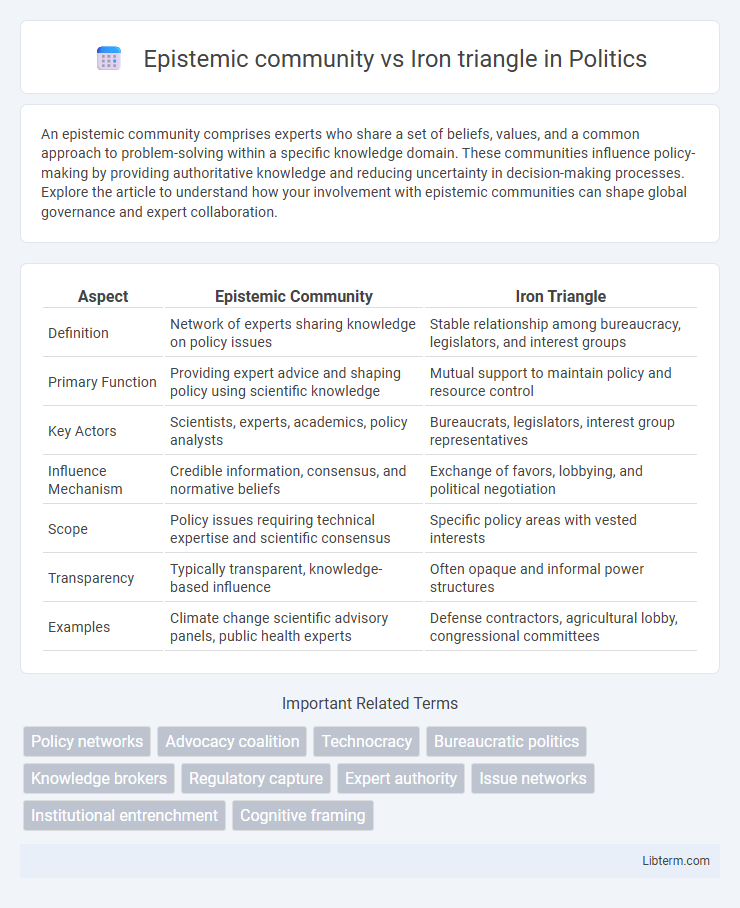An epistemic community comprises experts who share a set of beliefs, values, and a common approach to problem-solving within a specific knowledge domain. These communities influence policy-making by providing authoritative knowledge and reducing uncertainty in decision-making processes. Explore the article to understand how your involvement with epistemic communities can shape global governance and expert collaboration.
Table of Comparison
| Aspect | Epistemic Community | Iron Triangle |
|---|---|---|
| Definition | Network of experts sharing knowledge on policy issues | Stable relationship among bureaucracy, legislators, and interest groups |
| Primary Function | Providing expert advice and shaping policy using scientific knowledge | Mutual support to maintain policy and resource control |
| Key Actors | Scientists, experts, academics, policy analysts | Bureaucrats, legislators, interest group representatives |
| Influence Mechanism | Credible information, consensus, and normative beliefs | Exchange of favors, lobbying, and political negotiation |
| Scope | Policy issues requiring technical expertise and scientific consensus | Specific policy areas with vested interests |
| Transparency | Typically transparent, knowledge-based influence | Often opaque and informal power structures |
| Examples | Climate change scientific advisory panels, public health experts | Defense contractors, agricultural lobby, congressional committees |
Defining Epistemic Communities
Epistemic communities consist of networks of professionals with recognized expertise and authoritative claims in a particular domain, who share a set of normative and causal beliefs, methods of validation, and a common policy enterprise. These communities influence policy by providing knowledge and framing issues through scientific or technical consensus, contrasting with the iron triangle's focus on stable, mutually beneficial relationships between interest groups, congressional committees, and bureaucratic agencies. The defining feature of epistemic communities lies in their epistemic authority and normative commitments, shaping policy decisions through expert knowledge rather than political bargaining.
Understanding the Iron Triangle Concept
The Iron Triangle concept describes the strong, symbiotic relationship among congressional committees, bureaucratic agencies, and interest groups, which collaboratively shape public policy through mutual support and resource exchange. This closed loop facilitates policy stability and favors entrenched interests, often at the expense of broader public input or transparency. Understanding this dynamic highlights how policy-making can become resistant to change, contrasting sharply with the more knowledge-driven and expert-oriented approach of epistemic communities.
Key Characteristics of Epistemic Communities
Epistemic communities consist of networks of experts sharing a common set of beliefs, values, and methods aimed at reducing uncertainty in policy areas through authoritative knowledge and consensus. These communities influence decision-making by providing specialized expertise and framing complex issues in a way that policymakers rely on to guide strategies. Unlike iron triangles, which involve strong, reciprocal relationships between bureaucratic agencies, interest groups, and legislative committees based on mutual benefits, epistemic communities prioritize knowledge-driven policy outcomes and the diffusion of expert consensus across institutional boundaries.
Structure and Dynamics of the Iron Triangle
The Iron Triangle consists of a stable, mutually beneficial relationship between congressional committees, bureaucratic agencies, and interest groups, each wielding distinct yet interdependent power to influence policy-making. This closed structure facilitates specialized, entrenched collaboration, where congressional committees provide legislative support, agencies implement programs, and interest groups offer electoral backing and information. Dynamic interactions within the Iron Triangle prioritize policy stability and incremental change, often limiting external influence and public scrutiny.
Goals and Motivations: Comparative Overview
Epistemic communities prioritize knowledge-based consensus, aiming to influence policy through expertise and scientific understanding. Iron triangles focus on mutually beneficial relationships between government agencies, interest groups, and legislative committees to secure resources and policy decisions. The key difference lies in epistemic communities seeking informed policy solutions, while iron triangles pursue pragmatic power and resource allocation.
Power and Influence in Policy-Making
Epistemic communities exert power in policy-making through specialized knowledge and expertise, shaping policy agendas by framing complex issues for decision-makers. Iron triangles wield influence via strong, reciprocal relationships among government agencies, interest groups, and congressional committees, ensuring policy outcomes favor their mutual interests. The epistemic community's authority stems from credibility and information control, while iron triangles rely on entrenched network stability and resource exchange for power consolidation.
Information Flow and Expertise
Epistemic communities consist of experts who share specialized knowledge and influence policy through consensus and evidence-based information flow, fostering informed decision-making. In contrast, iron triangles involve a closed information loop among bureaucrats, legislators, and interest groups, where expertise is often subordinated to mutual benefits and policy reinforcement. The epistemic community's reliance on credible, scientific expertise contrasts sharply with the iron triangle's strategic exchange of information to maintain power and resources.
Stability and Change in Policy Networks
Epistemic communities influence policy stability by providing expert knowledge and shared beliefs that guide long-term decision-making, fostering coherent and consistent policy frameworks. Iron triangles, composed of bureaucrats, legislators, and interest groups, contribute to stability through established reciprocal relationships but may resist change due to vested interests. While epistemic communities facilitate adaptability by integrating new information, iron triangles often perpetuate policy inertia, limiting responsiveness to evolving political and social conditions.
Case Studies: Epistemic Community vs Iron Triangle
Case studies on epistemic communities and iron triangles reveal distinct dynamics in policy-making processes. Epistemic communities leverage specialized knowledge and expert consensus to influence environmental and health policies, exemplified by climate change agreements where scientific expertise drives international cooperation. In contrast, iron triangles, such as those seen in defense procurement or agricultural subsidies, demonstrate entrenched alliances among bureaucracies, interest groups, and legislators prioritizing mutual benefits over broader policy goals.
Implications for Governance and Public Policy
Epistemic communities influence governance and public policy by leveraging expert knowledge and shared beliefs to shape decision-making frameworks and promote evidence-based solutions. Iron triangles create policy outcomes through stable, mutually beneficial relationships among bureaucracies, legislators, and interest groups, often prioritizing specific sectoral interests over broader public welfare. Understanding the dynamics between epistemic communities and iron triangles highlights the tension between technocratic expertise and entrenched political alliances in policy development.
Epistemic community Infographic

 libterm.com
libterm.com